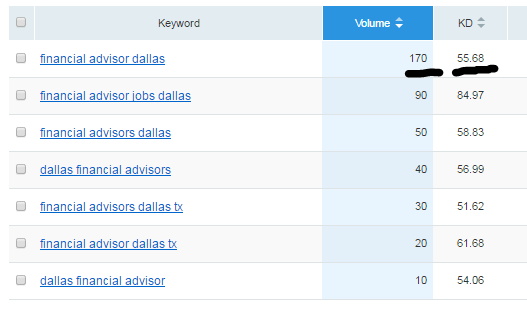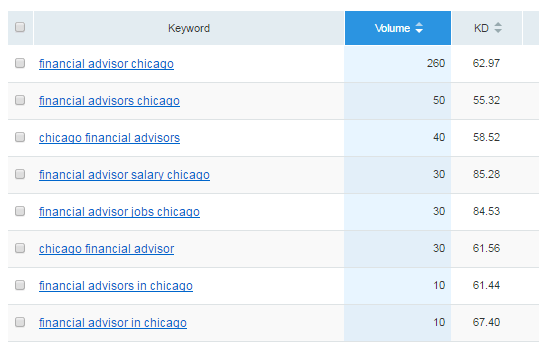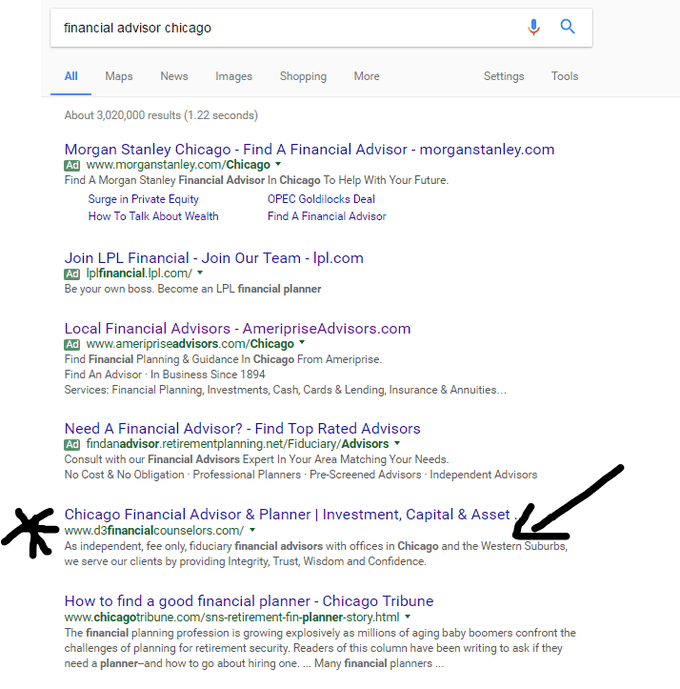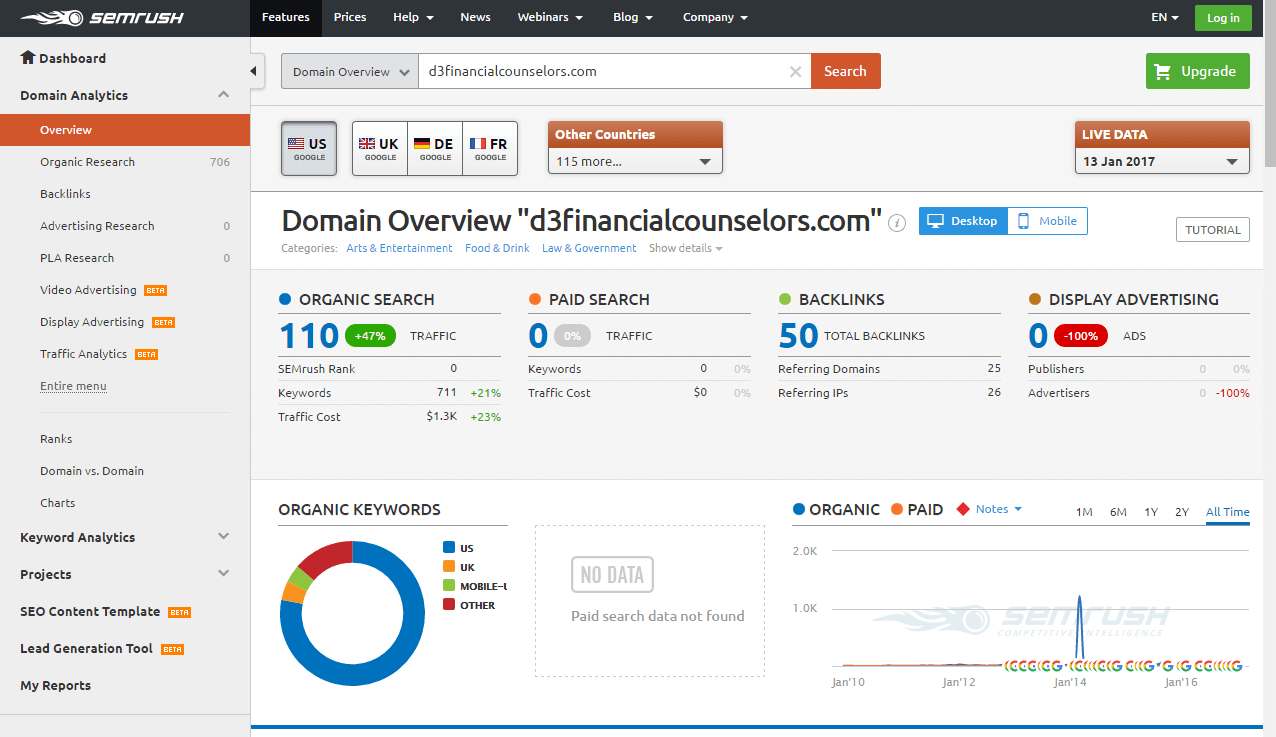5 SEO Strategies For Financial Advisors (That Actually Work)SEO can be one of the best marketing tools a financial advisor can use. It’s powerful because it can help you stand above your competition in the search results. It’s low-cost because it can drive traffic to your site that would otherwise cost thousands if you paid for it with ads.
Here’s what we’ll cover in this article: What Is SEO?
SEO is the process of affecting a website’s visibility in a search engine’s unpaid results. People often refer to this as “natural,” “organic,” or “earned” traffic.
In a nutshell, SEO is when you try to rank for certain keywords. Because the most popular search engine is Google, financial advisors who want to leverage SEO often aim to rank on its esteemed first page. SEO is important because it can help financial advisors: 🔑 Get found by prospective clients who search for relevant keywords. 🔑 Rank above your competition, which is very important — most people don’t even bother going to the second page of the search results. 🔑 Grow your online reputation and presence. 🔑 Get more email subscribers and inbound leads. 🔑 Increase your blog readership, if you have one. Few financial services professionals are taking advantage of proper SEO right now. And I don’t just mean financial advisors, either — I mean banks, credit unions, insurance agencies, real estate firms and much more. Once you understand the importance of SEO, you’ll see why leaving it out of your marketing strategy is a big mistake. 5 Incredible SEO Tips For Financial AdvisorsI could make this article much longer and complicated than it already is, but I want to give you the key ingredients of what you need to know about SEO as a financial advisor.
Plus, a lot of the SEO intricacies change regularly, so I wanted to write something that will (hopefully) stand the test of time. Buckle your seat belt, folks, because I’m going to give you incredibly valuable information that’ll help you grow your business if you apply it correctly. I’ve even included a few screenshots of exactly what to do! 1. Perform Keyword Research
This is by far the most important step. Keywords are the flesh and blood of search engines. Whenever you search for something on Google, you do it by typing keywords into the search bar — potential clients do the same thing whenever they look for a financial advisor.
In my opinion, the two most important metrics for keyword research are volume and keyword difficulty:
Here’s an example for you: In this example, you see that the most-searched keyword is “financial advisor Dallas,” with 170 searches per month and a keyword difficulty of 55.68 — this means it shouldn’t be too hard to rank for that keyword.
Remember: The lower the keyword difficulty, the easier it’ll be to rank. If I was brand new to SEO, for example, I would shoot for 60 and below. However, I want you to note that a simple change in the word order to “Dallas financial advisor” results in only 10 searches per month with roughly the same keyword difficulty. If you didn’t do your keyword research and tried to rank for “Dallas financial advisor,” you’d be missing out on all of those extra searches — and the money they could’ve helped you earn. The reason I emphasize keyword difficulty is that it’s unlikely that you’re an SEO expert who wants to spend hours on your website. Leave that to the pros. It’s critical to get the low-hanging fruit to get some SEO juice. In this next example, I’m showing you the “financial advisor Chicago” keyword to elaborate on keyword difficulty. As you can see, financial advisor keywords are more difficult to rank for in Chicago than Dallas — you need to know this going in, because the higher your keyword difficulty number is, the more work it’ll take to rank in the search engines. Again, I want to keep this simple. I know there are tons of tools and metrics you can use in keyword research, but these are the two I’ve found that give you the biggest ROI. 2. Create High-Quality Content
Advisors have overused the whole “content is king” approach so much this past decade, but it’s true: Content is the ruler of the internet, and the goal of a search engine is to organize and deliver relevant content.
To prove to the search engine that your content is relevant, you want to integrate your chosen keywords into your content. However, make sure you don’t stuff your page full of keywords — this is literally called “keyword stuffing,” and search engines can penalize you for it. Instead, focus on providing well-written content that includes a few natural but strategically placed keywords. A lot of financial advisors — and many other business-minded individuals — might think, “OK, so I need content. How can I get this as easily and cheaply as possible?” Be careful! Don’t just hop over to a freelancer website and outsource your content for $10 an article. It might tempt you, but you can’t outsource cheap (more like almost slave labor) content writers to write amazing content — ultimately, you get what you pay for. Write your own content, and if you can’t, don’t be cheap. You can either spend a few dollars per click or you can spend $100 to $300 for a quality piece that’ll consistently deliver and keep traffic. 💡 If you want to win, you have to play the long game. SEO demands content. The biggest fundamental of SEO is its use of keywords, and content is a practical use of keywords. Great content marketing is all about writing content for real people, with real value, that just so happens to use the keywords you target. By the way, I wrote this article with the keyword “financial advisor SEO” and “SEO tips for financial advisors” in mind. They don’t have a huge search volume, but I’ll gain visibility just by creating a decent piece of content that people will share. I can be completely transparent about this stuff, because it works. 3. Build High-Quality Backlinks
Hmm… there’s that “high quality” phrase again. For SEO, everything needs to be high quality, or white-hat, to avoid penalization by future search engine updates. Take my word for it: People who try to game the system end up getting crushed.
Another fundamental of SEO is building backlinks. Backlinks are incoming links to your website from another site. They let search engines know another website finds your content valuable enough to link to it, which helps signify authority and lets you rank higher. Search engines also consider the content of linking sites to determine the quality of a link. That means when inbound links to your website come from other sites and they have content related to yours, search engines will consider these links more relevant. But if your links come from sites with completely unrelated content, for example, they won’t be relevant. 👉 Pro-tip: The more relevant the linking site, the better the quality of your backlink. That's why it's not a good idea to spam websites and directories for them. As a rule of thumb, search engines look for natural links built slowly over time, so don't try to build hundreds of low-quality backlinks, and definitely don't buy them. Over the years, unscrupulous people have tried everything to beat the system –– everything from link farms to buying other domains, to hidden links. However, search engines get smarter every day, and pulling these stunts means you risk your website getting banned entirely. 4. Make Your Website FasterGoogle has indicated site speed is one of the signals used by its algorithm to rank pages. So, if you've got a slow-loading site, it could negatively impact your rankings.
A fast loading site is also important for a good user experience. Pages that take a long time to load tend to have higher bounce rates because people don't want to wait. According to research by Google, 53% of mobile users leave a site that takes more than three seconds to load. To find out how fast your website loads, use this site: GTmetrix.com It's a free tool that analyzes your website's performance and gives you a detailed report on how to make it faster. They can also notify you when a page is slow - this is handy to have if you have web developers who are adding new pages for you and you want to be notified if anything's out of the ordinary. 💡 One of the best things financial advisors can do to make their websites faster is to compress the images on their site. You can use a tool like ResizeImage.net to adjust the size of an image to save valuable space and load time. 5. Create Click-Worthy Meta DescriptionsA meta description is a short snippet that summarizes a web page. It forms an HTML tag that search engines show as a preview. Here's an example:
Meta descriptions are important because they get users to click your content. Financial advisors can improve their SEO by writing click-worthy meta descriptions, because if more people click on your content, search engines consider you to be worthy of higher rankings.
Here are some pointers on writing better meta descriptions:
Plus, make sure your descriptions match your content — you don't want to trick someone into clicking your link, because that person will click and quickly bounce back, which is bad for rankings. The Secret SEO Weapon Financial Advisors Don't Know They Have...What I'm about to share with you is something that’ll change the way you “do SEO” and dramatically cut your learning curve. I suggest you really read this and take action if you're serious.
This is an awesome way to get links quickly. What you want to do is study your competition's backlinks. Think about it: Other people have already done the hard work for you. Because they already have valuable backlinks, all you have to do is look at their links and see if they’re worth your time. I’m not suggesting you copy everything your competitors do. In fact, if your competitors have low-quality, spammy backlinks, you definitely don’t want to copy them. Instead, be aware of your competitors' links and look for opportunities, like the high-quality pages where the competitor earned links. Replicating your competition's backlinks takes a lot of the hard work out of link building and SEO. Plus, it's easy for a newbie to do. Here’s how to do it in three steps. 1️⃣ Make A List Of The Top Search Results...The first thing you need to do is type in your desired keyword and get the URLs for the top search results. Just do a quick Google search and make a note of each URL.
In this example, I searched for “financial advisor Chicago.” Here are my results. (I pointed out the link I researched!) 2️⃣ Check The Competitor BacklinksI use SEMrush to research competitor backlinks, simply because it’s the easiest platform to use and it gives a ton of data.
💡 SEMrush offers a free trial - you can take advantage of that here. Take your list of URLs and check them, one by one, in your tool. Just to be clear, I have no relation whatsoever to D3 Financial Counselors. Until I performed this Google search, I’d never heard of them. However, I think it’s great they rank so high for a valuable keyword, so kudos to them. With that said, it’s time for me to plug their URL in SEMrush to see what backlinks they have. As soon as you enter any URL into SEMrush, you are given a general overview, which is what you see above. Depending on the information you’re looking for, you can navigate to go more in-depth. In this case, I click on the “backlinks” tab and then click on the “dofollow” links. Why did I click on just the dofollow links? Well, those are the only links that provide any SEO benefit, so I want to cut right to the chase.
I clicked on the very first backlink just to check it out. Turns out it included D3 Financial Counselors in a list of the best financial advisors in Chicago. Awesome!
What I would do, just as an example, is reach out to AdvisoryHQ and see if there’s any way they’d consider me for a new list, get published as a guest post, give some free advice, become a contributor and more — the whole idea is to get a link from this website.
3️⃣ Study The Links And Make A Judgment CallNow, all that's left is to go through each of the links one at a time.
Use your head: Are the links high-quality? Are they spammy? If a competitor left a blog comment on a relevant site, register and leave your own comment. Note: Blog comments carry very little, if any, SEO juice, but I'd rather have every advantage possible. Sometimes your competitors will have guest posts — if that's the case, send an email to submit your own guest post and stress that it’ll be similar content. If you catch “earned” links on sites, reach out to the site owner and let them know you have similar or better content that can be a valuable resource for them. As you work through your list, you'll get a good feel for the process. When you do this, you uncover and create awesome links you wouldn't have gotten otherwise. You'll also build some general understanding of SEO. Be sure you keep track of everything you do and all the people you email. I suggest you use a CRM like Capsule — that way you can see what works and what doesn't. Finally, don’t rely on this one strategy. The whole purpose of link building is to overtake your competition, not just catch up with them. Even if you get 100% of their links, which you probably won't, you need to gain new links your competitors don't have. Scale Your Website With Financial Advisor SEO Tips From My Podcast...More SEO tips? Yup, and it’s not even Christmas. This time, they’re from another financial advisor and SEO expert, Taylor Schulte, founder and CEO of Define Financial.
On an episode of my Financial Advisor Marketing podcast (titled "Awesome SEO Advice For Financial Advisors"), I invited Schulte to talk about the effective SEO strategies he used to catapult his business. You can listen to the episode below, but some show highlights include: 💡 Why SEO can get you a ton of leads without putting in a lot of work. [10:55] 💡 Why putting too many buttons on your website makes people click off your website, even if you’ve got the world’s best SEO. [11:35] 💡 How to make sure only qualified prospects in your target market contact you through your website. [18:21] 💡 How to tell Google what keywords to rank your website for. [21:34] 💡 The step-by-step method to dominate a niche online, even if no one in your market knows you. [30:09] Schulte went from managing $15 million in assets to $100 million at his firm — he did it by leveraging SEO as a marketing tool, including these three strategies.
1. Refresh And Consolidate ContentIn the early days of SEO, it was easier to get away with quantity over quality with your online content. If you wrote a blog post daily, for example, Google would reward you with more visibility based on the volume of content you put out — but those days are long gone.
Now, quality rules, and Google will penalize your website for having content that’s outdated or holds little value. If you fill your financial advisor website with blogs that don’t bring in traffic or lead to appointments, do what Schulte did: a content cleanup. Schulte and his team went through each blog on his website and deleted any piece of content that didn’t speak to his target demographic, plus any that just wasn’t good. With the remaining blog posts, your next step is to refresh and consolidate the content. How can you make the blog even more valuable? Here are a few ways you can do that:
After you’ve optimized your blogs, don’t forget to change the dates before you republish them. If you wrote a blog in 2016 and don’t update it to 2021, Google won’t catch the signal that you added more value to it — and Google likes to see improvements before it throws you an SEO bone. Next, you want to consolidate any blogs that would work better together than apart. A lot of financial advisors don’t realize it, but you can cannibalize your content by following arbitrary rules about how many blogs you should write and what you should write about. You might think you add value to your website by writing 5 separate blogs about credit scores, but you only negatively impact your ranking in search engines. Instead of remixing the same idea over and over, consolidate them into one Super-Blog about all things credit scores — you’ll improve the content, make it even more beneficial for potential clients and increase your visibility in search. 2. Have Clear Messaging And CTAsSchulte understands the importance of an effective website, which is why he’s invested more than $50,000 over six years into his.
I’m not advising you to do this, but you should reevaluate your website, especially the homepage — in fact, he says that’s the first thing you should do before optimizing it with SEO. Your website’s homepage is the first thing prospects see, so tell them right away who you are and how you can help them. For example, “Retirement Planning For Individuals Over Age 50,” is the first you see when you land on Schulte’s company website. Then, he tells you he can help you reduce your taxes, invest smarter and optimize your income. When your SEO and marketing efforts bring in the potential clients you need to scale your business, they need to have a customer journey to follow. That’s where your CTA comes in. On your homepage, you should have one clear CTA for your desired next step — not one, three or 10. Just one. Whether it’s joining your mailing list, scheduling a call or downloading a lead magnet, your job is to make it easy for users and potential clients to take that action. Typically, on financial advisor websites, CTAs are often phrases like, “learn more,” “contact us,” or “schedule a call,” but how enticing is that, really? Not very much at all. Prospects see those buttons on tons of other websites, so they’re likely to gloss over those CTAs. Schulte’s CTA is a simple but effective one: “Start here.” To him, this one is magical because it stands out. When visitors land on his website and like what they see, that CTA will guide them to their next step with you. You can also make your CTAs more descriptive to let people know exactly what’s on the other side of the button — after all, some people don't like surprises. If you offer a free retirement assessment like Schulte, make that your CTA to highlight the (free!) value you provide. In one fell swoop, you make your CTA more enticing and weed out the people who won’t do business with you. Win-win. 3. Tailor Your Website And Add DescriptionsYour website needs proper titling and descriptions on the backend.
Just like you name computer files to find them easier, you need to name and define your website, too — that way, search engines know who you are, what you do and when to put your website in front of people who search the keywords you rank for. We covered meta descriptions earlier, so let’s talk about other ways you can help search engines connect the dots for users about your online presence. There are two ways you can do this:
If WordPress doesn’t host your site, no biggie. Website builder sites like Wix or Squarespace often make it easier for you to update titles and descriptions. BONUS TIP: Get Active On Social Media...Even in the financial services industry, failing to establish a significant social media presence can negatively impact your brand and put you at a disadvantage.
It has been found that presence on social networking sites (which includes likes, shares, comments, etc.) is correlated with better rankings. This means that the higher up the website ranks in the search engine, the higher the chances are that there's a large social media presence. The reason I didn't include this as one of the tips is because correlation doesn't equal causation. The theory is that content that gets shared a lot on social media may be seen as more valuable by the search engines. But Google has repeatedly denied that they're using social signals for SEO ranking purposes. Plus, social media sites use nofollow links, which don't give you any link juice. As I said, correlation isn't causation. There's a strong correlation between eating ice cream and drowning deaths. The reason is because they both happen in warm weather, but eating ice cream does not CAUSE you to drown. The same thinking can be applied for social signals. In any case, you should be sharing your high-quality content on social media to encourage sharing and to drive organic traffic. P.S. If you're a financial advisor who wants to get more clients from LinkedIn, make sure you check out How to Get Clients With LinkedIn: How Financial Advisors Can Set Appointments and Convert Prospects With LinkedIn |







